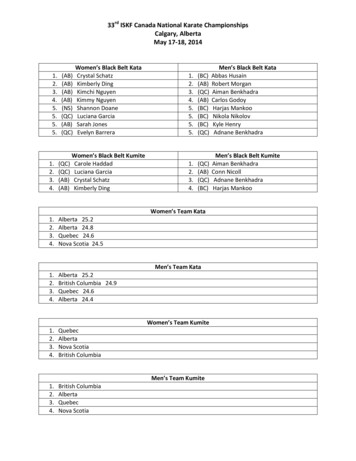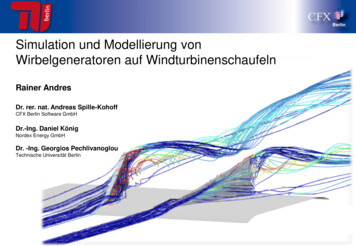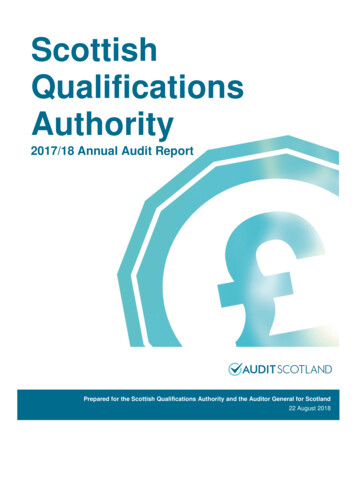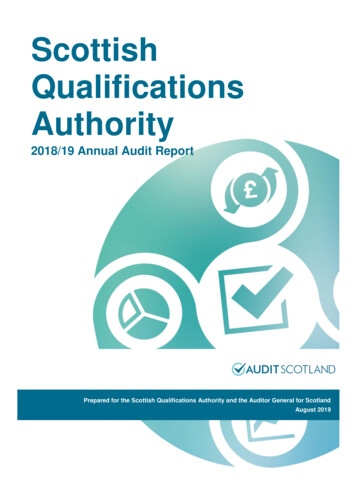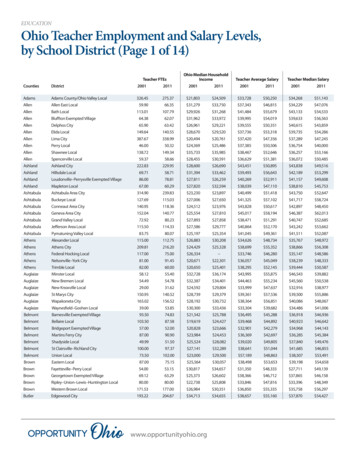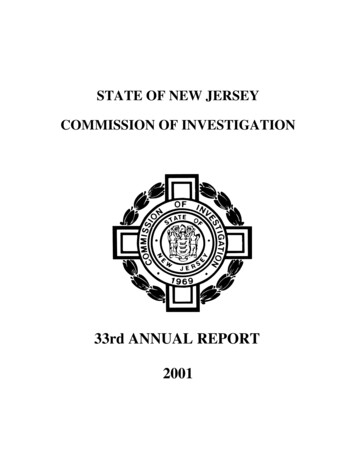
Transcription
STATE OF NEW JERSEYCOMMISSION OF INVESTIGATION33rd ANNUAL REPORT2001
STATE OF NEW JERSEYCOMMISSION OF INVESTIGATION33rd ANNUAL REPORT2001
Members of the CommissionRev. Francis E. SchillerChairRev. Schiller was appointedto the Commission in October2001 by Acting GovernorDonald T. DiFrancesco. Anattorney, he is counsel to thefirm of Connell Foley L.L.P., Roseland, and formerpartner in the firm of Schiller, Squeo & Hartnett,L.L.C., Jersey City. Rev. Schiller served as a memberof the New Jersey Athletic Control Board during2000-2001 and was a member of the Seton HallUniversity Self-Study Committee from 1999 to 2001.He served as executive director of Jersey CityCommunity Help Corp. between 1975 and 1980,executive director of the Community Drug & AlcoholProgram of Hudson County from 1973 to 1978, anddirector of Patrick House Family Health Center from1971 to 1973. Rev. Schiller has served in the TeamMinistry at Saint Patrick Roman Catholic Church inJersey City since 1969 and at Assumption/All SaintsRoman Catholic Parish in Jersey City since 1994. Agraduate of Seton Hall University and Seton HallUniversity Law School, he pursued graduate studies atthe New School for Social Research. He was ordainedin 1965 at Immaculate Conception Seminary.W. Cary EdwardsMr. Edwards was appointedto the Commission in 1997 byGovernor Christine Whitman.An attorney since December1970, he is managing partnerin the law firm of Edwards &Caldwell, with offices in Hawthorne and Trenton. Mr.Edwards served as New Jersey Attorney General from1986 to 1989, prior to which he was chief counsel toGovernor Thomas H. Kean between 1982 and 1986.He was elected to the New Jersey General Assembly in1977 and served three terms and was a member of theBorough Council in Oakland between 1975 and 1979.He has served as an adjunct faculty member of SetonHall University and the Eagleton Institute ofGovernment, Politics and Public Policy at RutgersUniversity. A graduate of Seton Hall, Mr. Edwardsearned his law degree in 1970 from Seton HallUniversity Law School. He resides in Oakland.John J. Farmer, Jr.Mr. Farmer was appointed tothe Commission in January2002 by Acting GovernorDonald T. DiFrancesco. Anattorney, he served as NewJersey Attorney Generalbetween 1999 and 2002. Prior to that, Mr. Farmerserved as chief counsel to Governor Christine ToddWhitman from 1997 to 1999 and as senior associatecounsel between 1994 and 1997. He was AssistantUnited States Attorney for New Jersey between 1990and 1994, and before that, was an associate at the lawfirm of Riker, Danzig, Scherer, Hyland & Perrettifrom 1988 to 1990 and law clerk to New JerseySupreme Court Associate Justice Alan B. Handlerfrom 1986 to 1987. Mr. Farmer served as an adjunctprofessor at Seton Hall University Law Schoolbetween 1993 and 1997. A graduate of GeorgetownUniversity, he earned his law degree fromGeorgetown Law Center in 1986. He resides inFlemington.Joseph R. Mariniello, Jr.Mr. Mariniello wasappointed to the Commissionin March 2002 by AssemblySpeaker Albio Sires. Anattorney, he is a partner inthe law firm of Mariniello &Mariniello, P.C., with officesin Fort Lee. Mr. Mariniello has served as counsel tonumerous municipal governments, boards ofadjustment, planning boards and boards of educationthroughout northern New Jersey. He has alsoappeared before a range of state agencies both in NewJersey and in Michigan. A resident of Ridgewood, Mr.Mariniello graduated from Villanova University in1991 and earned his law degree from the University ofNotre Dame in 1994.
TABLE OF CONTENTSINTRODUCTION .1HISTORY .5OPERATIONS . .8INVESTIGATIONS AND REPORTS – 2001 . 11WASTE, FRAUD AND ABUSESocieties for the Prevention of Cruelty to Animals . 11WASTE, FRAUD AND ABUSEN.J. Enhanced Motor Vehicle Inspection Contract . 18PRIOR INVESTIGATIONS . 29COMMISSION MEMBERS, 1969-2002 . . . 52
INTRODUCTIONWhy the SCIThe State Commission of Investigation was created by law in 1968 to fulfill a uniquemission of vital importance to the citizens of New Jersey: to attack organized crime and politicalcorruption; to root out waste, fraud and abuse of taxpayers’ dollars; to shed light on matters thatsubvert public justice and public safety; and to recommend appropriate reforms and improvementsin laws and in the operations of government. The Commission was given an extraordinarymandate: to pursue these tasks within a framework untainted by political intrusion, self-interest orfavoritism.Thirty-four years later, this investigatory and fact-finding mission – as well as the need foran independent entity to carry it out – remains no less vital.Singular AchievementsDuring 2001, the Commission bolstered its record of exemplary public service with wideranging investigations that shed light on crime and corruption, waste of taxpayers’ money and otherabuses of the public trust. In each of the following instances, the citizens of New Jersey werealerted to a range of systemic problems and the need for comprehensive reforms: SOCIETIES FOR THE PREVENTION OF CRUELTY TO ANIMALSA statewide investigation of the Societies for the Prevention of Cruelty to Animalsrevealed widespread abuse and malfeasance at the hands of numerous individuals
responsible for animal welfare in New Jersey. The Commission found that SPCAs at boththe state and county levels have been subverted to the point where, in many instances, theyare incapable of fulfilling their primary mission – the effective and reliable enforcement ofanimal-cruelty laws. The investigation resulted in a number of criminal prosecutions at thestate and county levels. Also, in addition to calling for a new framework through which theanit-cruelty laws could be effectively administered, the Commission recommended a seriesof reforms aimed at improving and strengthening animal-welfare operations throughoutNew Jersey. N.J. ENHANCED MOTOR VEHICLE INSPECTION CONTRACTThe Commission conducted a comprehensive investigation of the events andcircumstances leading to privatization of motor vehicle inspection services in New Jerseyand found a process thoroughly undermined by mismanagement and political manipulation.Preliminary findings were aired in sworn testimony during two days of public hearings inJuly. A final report, incorporating the public record as well as significant additionalinformation gathered subsequent to the hearings, was issued in March 2002. This documentformed the basis for a series of recommendations to shield the state’s procurement processfrom improper influence, to reform the procedures by which public contracts are designedand awarded and to afford greater control over, and disclosure of, efforts by lobbyists andvendors to influence the process.2
A Broader MissionThe true measure of the Commission’s performance far exceeds the findings and results ofinvestigations completed during the past year. Beyond the public activities detailed in this annualreport, the Commission and its staff currently are engaged at various stages in a range of significantinvestigations related to all elements of the Commission’s statutory purview, including organizedcrime, official corruption, and waste and abuse of government funds. In that regard, nearly 200Commission subpoenas were served during 2001 seeking access to scores of individuals, tens ofthousands of documents and a range of other exhibits relevant to those active investigations. Also,as in years past, barely a week went by that the Commission did not receive requests forinvestigative action, assistance or advice from citizens of New Jersey. Commission records includenearly 60 such citizen contacts via mail and telephone requiring evaluation and response.Throughout the year, Commission staff assisted multiple law enforcement and oversightagencies at the local, county, state and federal levels. The SPCA probe, for example, produced aframework for criminal charges brought against a number of individuals. They included a formerBurlington County SPCA Treasurer, who was indicted on charges of diverting more than 45,000in SPCA funds for personal use, and the former president of the Cape May County SPCA, alsoindicted for theft. Both pleaded guilty and agreed to pay restitution. In actions that reflected keyCommission reform recommendations, additional state funding was provided for the inspection ofanimal shelters, and legislation was signed upgrading the crime of animal cruelty from a disorderlypersons offense to a felony, and requiring sentencing courts to order mental health counseling for3
juvenile offenders. In another area, a bill was signed into law requiring the Department of Law andPublic Safety, in conjunction with the Statewide Computer Crime Task Force, to establish andmaintain a 24-hour toll-free telephone hotline for members of the public to report computer-relatedcrimes, including online child pornography, cyber-stalking, threats of violence in schools and otherinstitutions, internet fraud and unauthorized intrusions into computer systems and networks. Themeasure was designed to implement a central recommendation of the Computer Crime reportissued jointly by the Commission and the Office of the Attorney General in June 2000.In sum, 2001 was a productive year for the Commission in its service to the citizens of NewJersey. Above all, given the fact that savings generated by efficiencies, reforms and improvementsresulting from the Commission’s work far outweigh its overall operating costs, this agency onceagain proved itself to be an effective public investment.The Commission’s public documents, including the full text of reports of investigations, areavailable electronically via computer at http://www.state.nj.us/sci.4
HISTORYThe Commission was established in 1968 after extensive research and public hearings bythe Joint Legislative Committee to Study Crime and the System of Criminal Justice in New Jersey(the “Forsythe Committee”). That panel was directed by the Legislature to find ways to correct aserious and intensifying problem involving organized crime and political corruption.Thecommittee’s final report, which confirmed a crime-control crisis in those areas, attributed theexpanding activities of organized crime to “failure . . . in the system itself, official corruption, orboth.” As a result, sweeping recommendations for improving various areas of the criminal justicesystem were proposed.Two of the most significant recommendations were for the creation of a new criminaljustice unit within the Executive Branch, and the establishment of an independent Commission ofInvestigation. The Forsythe Committee envisioned the proposed criminal justice unit and theCommission of Investigation as complementary agencies in the fight against crime and corruption.The criminal justice unit was to be a large organization with extensive personnel, empowered tocoordinate, conduct and supervise criminal investigations and prosecutions throughout the state.The Commission of Investigation was to be a relatively small but expert body that would conductfact-finding investigations, bring the facts to the public’s attention, refer its findings to appropriatelaw enforcement agencies for possible prosecution and make recommendations to the Governor andthe Legislature for improvements in laws and in the operations of government.5
As the Forsythe Committee stated in the final report of its comprehensive study, this wouldnot be “a ‘crime commission’ alone. There are many occasions,” the panel concluded, “when hardhitting, expert fact-finding is needed without involving the criminal process or implying criminalviolations are under investigation. . . .This Commission will provide a significant, independent‘watchdog’ for the entire system. . . .”As a result of the Forsythe Committee’s recommendations, the Division of Criminal Justicein the Department of Law and Public Safety and the State Commission of Investigation, structuredas an independent agency of the Legislature, were created. New laws were designed – effectivelyso, as history has shown – to prevent conflict and duplication between the Commission’s operationsand those of prosecutorial authorities.The Commission was given the responsibility to maintain a constant vigil against theintrusion of organized crime into society, to expose systemic wrongdoing or governmental laxityvia fact-finding investigations, and to recommend new laws and other remedies to protect theintegrity of the governmental process. The Division of Criminal Justice and other prosecutorialagencies were given the responsibility to seek indictments or file other charges of violations of lawand to bring the violators to justice, where appropriate.Legislation creating the SCI in 1968 established an initial term beginning January 1, 1969,and ending December 31, 1974. The Legislature extended the term of the SCI for five-year periodson four subsequent occasions: in 1973 for a term expiring December 31, 1979; in 1979 for a termexpiring December 31, 1984; in 1984 for a term expiring December 31, 1989; and in 1989 for a6
term expiring December 31, 1994.On Dec. 28, 1994, legislation took effect extending theCommission’s term for a period of 18 months, through June 30, 1996, pending the outcome of areview by a special committee appointed by the Governor, the President of the Senate and theSpeaker of the General Assembly. On February 7, 1996, the review committee recommended thatthe Commission’s operating authority be extended for six years, until July 1, 2002. Legislationincorporating this central recommendation was enacted into law with the Governor’s signature onJune 28, 1996.The Commission’s status as a temporary agency subject to periodic review was rescindedeffective January 7, 2002. On that date, Acting Gov. Donald T. DiFrancesco signed legislationestablishing the Commission as a permanent entity of New Jersey government.The unique and complementary role of the Commission has been noted repeatedly in threeseparate and comprehensive reviews that have been conducted of the SCI’s operations — in 1975,1983 and 1995. In each instance, the reviewing panel found that the SCI performs a valuablefunction and strongly concluded that there is a continuing need for the Commission’s work. Thefinal review committee report summarized this view, stating, “. . .[I]t is crucial to New Jersey thatits citizens have confidence that government on all levels is operating appropriately and efficiently.The SCI is uniquely positioned to expose corruption and mismanagement to New Jersey residentsand to make recommendations aimed at improving New Jersey’s system of government.”7
OPERATIONSTo eliminate even the appearance of political influence in the Commission’s operations, nomore than two of the four Commissioners may be of the same political party, and they derive fromthree separate appointing authorities. Two Commissioners are appointed by the Governor and oneeach by the President of the Senate and the Speaker of the Assembly. It thus may be said theCommission by law is bipartisan and, by concern and action, is nonpartisan. This central constructmakes the Commission unique among all other agencies of government, endowing it with theintegrity and the independence necessary to perform its job in a credible fashion, especially wherepolitically-charged or otherwise sensitive investigations are concerned.The Commission specifically is invested with the duty and power to conduct investigationsin connection with:(a) The faithful execution and effective enforcement of laws of the state, withparticular reference but not limited to organized crime and racketeering;(b) The conduct of public officers and public employees, and of officers andemployees of public corporations and authorities;(c) Any matter concerning the public peace, public safety and public justice.The enabling statute provides further that the Commission shall, by direction of theGovernor or by concurrent resolution of the Legislature, conduct investigations and otherwise assistin connection with the removal of public officers and in the making of recommendations to theGovernor and the Legislature with respect to changes in existing law required for more effectiveenforcement. The Commission also is empowered to investigate the management or affairs of anydepartment, board, bureau, commission, authority or other agency created by the state, or to which8
the state is a party.The statute assigns to the Commission a wide range of responsibilities and powers. It mayconduct public and private hearings, compel testimony and the production of other evidence bysubpoena and has authority to grant limited immunity from prosecution to witnesses. Since theCommission does not have prosecutorial functions, it is required to refer information of possiblecriminality immediately to the Attorney General.One of the Commission’s primary statutory responsibilities, when it uncovers irregularities,improprieties, misconduct or corruption, is to bring the facts to the attention of the public with theobjective of promoting remedies and reforms. The format for public action by the Commission isbased on the complexity of the subject and the clarity, accuracy and thoroughness with which thefacts can be presented. The Commission has proceeded by way of public hearings, the issuance ofpublic reports, or both.Witnesses appearing before the Commission in public and private hearings are protected bythe New Jersey Code of Fair Procedure, the requirements of which were incorporated in theCommission’s enabling statute in 1979. Constitutionally required due process is afforded under theprovisions of that code, and the courts have upheld the integrity and fairness of the Commission’sinvestigative procedures. For example, all witnesses have the right to be represented by counselwhen appearing before the Commission at public or private hearings. Additionally, any individualcriticized in a proposed Commission report is, by law, given an opportunity to review relevantportions of the report. The individual may then submit a written response which shall be included9
in the final report. As a practical matter, the Commission always has been careful to evaluateinvestigative data in private in keeping with its obligation to avoid unnecessary stigma andembarrassment to individuals.Indictments and convictions which may result from referral of criminal matters by theCommission to other agencies are not the only test of the efficacy of its public actions. At least asimportant is the deterrent effect deriving from the Commission’s very existence, as well as thecorrective statutory and regulatory reforms spurred by arousing public and legislative interest. Aprime example involved the enactment of legislation in the wake of a Commission investigation ofa massive, organized crime-inspired scheme to evade taxes on motor fuels. According to the stateDivision of Taxation, that statutory change alone has enabled the state to recover an estimated 22million annually in tax revenues. Additionally, the Commission’s December 1998 report on publicpension and benefits abuses presented a veritable catalogue of needless waste and outlined a rangeof proposed reforms that would save taxpayers additional millions. Further, the Commission’sSeptember 2000 report on waste and abuse in public school roofing provided the state and itslocalities with invaluable insights into the subversion of multi-million-dollar public constructionprojects by unscrupulous contractors.The Commission takes particular pride in these and in the numerous other investigationsand reports which have similarly resulted in taxpayer savings and in improved laws andgovernmental operations throughout its existence.10
INVESTIGATIONS AND REPORTS — 2001Waste, Fraud and Abuse:Societies for the Prevention of Cruelty to AnimalsBased upon citizen complaints and other materials suggesting improprieties, theCommission undertook a comprehensive investigation of the activities and financial practices ofthe various Societies for the Prevention of Cruelty to Animals in New Jersey.1 The findings,detailed in a report released in April, revealed a panorama of waste, abuse and malfeasance soextensive as to render many of these organizations incapable of fulfilling the primary statutoryobligation embodied by their very name – the enforcement of state laws designed to preventcruelty to animals.2The investigation showed that despite New Jersey’s reputation forinnovative animal welfare and control programs, the state remains mired in an archaic legislativescheme that places the enforcement of these laws in the hands of unsupervised volunteer groupsof private citizens.The 1868 and 1873 laws that created the New Jersey and county SPCAs arose at a timewhen law enforcement agencies were in their infancy and the enforcement of laws was entrustedfrequently to private citizens. The investigation found that today, these organizations represent arudimentary system that has not kept pace with the state’s advancements in law enforcement orits interests in the welfare of animals. In light of the New Jersey’s current highly stratified and1At the time of this investigation, there were 16 county SPCAs and one state-level SPCA in New Jersey.The Commission’s report was completed in December 2000, but its release was delayed by compliance withN.J.S.A. 52:9M-12.2.112
professional law enforcement system, the Commission concluded that it is an anomaly that thestate continues to empower organizations of private citizens to carry weapons, investigatecriminal and civil conduct, enforce laws, issue summonses, effect arrests and obtain and executesearch warrants.Key Findings The SPCAs are accountable to no governmental authority. Because there are nostandards, rules or guidelines governing their composition, operation, training oractivities, there is no consistency or uniformity in their make-up, functioning orenforcement of the laws. Key officials in six of the county SPCAs (Bergen, Burlington, Cape May, Hudson,Ocean and Warren) diverted funds and property meant for animal welfare forpersonal use. Monetary bequests left by deceased individuals to benefit animals were used insteadto pay for firearms, ammunition, vehicles and other items unrelated to animal welfareor to the effective enforcement of the state animal-cruelty laws. County SPCA organizations, some of which operated in paramilitary fashion, havebecome havens for gun-carrying “wannabe” police officers motivated by personalgain. These individuals operate without proper training or adequate oversight bystate or local authorities. Conditions in animal shelters maintained at the time of the investigation by twocounty SPCAs – Cape May and Hudson – were found to be deplorable. At theHudson County shelter in Jersey City, SPCA officials skimmed patron fees and sold12
dog food for personal profit, while animals languished in overcrowded, poorlyventilated enclosures without adequate food, water or veterinary care. The state and local system of shelter inspections was found to be inadequate andreplete with weaknesses, including lax enforcement, lack of follow-up inspectionsand wide variations in the manner in which shelter conditions are reported.In sum, the Commission found that the SPCAs run the gamut in effectiveness ofoperation, scrupulousness in financial matters and enforcement of the cruelty laws. While someare operated in a highly professional manner, according to set rules and regulations, others arerun as the personal domain of a well-entrenched few who discard the rules on a whim. Manyindividuals involved in these societies are dedicated to the welfare of animals and committed tofunctioning within an organized, structured environment, while others are motivated strictly bypersonal gain. Because the SPCAs operate beyond the reach of government, they have becomehavens for those who cannot obtain legitimate law enforcement positions. Although theseorganizations represent an opportunity for some to improve the plight of animals, they symbolizenothing more than cash cows for others. Many societies are stagnant because of the longevity oftheir officers. Typically, individuals continue in office because no one else is willing to assumethe positions. Consequently, either there is no nomination process or it is a farce. Officers arehandpicked, slates of officers are unopposed, and elections are rendered meaningless. Moreover,just as the operations and activities of the societies are characterized by extremes ofinconsistency, so are the animal shelters they maintain.13
Referrals and RecommendationsThe Commission referred the findings of this investigation to the following governmentalagencies: Office of the New Jersey Attorney General – Division of Criminal Justice; PoliceTraining Commission; Division of Motor Vehicles; and Division of ConsumerAffairs – Regulated Business Section, Charitable Registration and Investigation New Jersey State Board of Veterinary Medical Examiners New Jersey Division of Purchase and Property New Jersey Division of Taxation United States Internal Revenue Service***The Commission’s examination of the SPCAs and issues related to the state’s system forinvestigation of animal cruelty, abuse and neglect also formed the basis for a series ofrecommendations designed to strengthen that system and improve the welfare of animals.Primary recommendations included:1. Eliminate SPCAs as Enforcers of Animal Cruelty LawsStatutes bestowing enforcement of the animal cruelty laws upon the SPCAsshould be repealed. The enforcement function should be placed within the framework ofgovernment in order to ensure that adequate funding and resources are available toenforce these laws in a professional, uniform and responsive manner. (A bill, A-363, to14
accomplish this central recommendation is pending in the current session of theLegislature.)2. Update and Vigorously Enforce the Animal Cruelty StatutesCurrent language in the state’s animal-cruelty laws is vague or outdated, offeringlittle protection for animals or guidance for enforcement. Moreover, the current criminaland civil penalties for violations are woefully inadequate, thus making application of theprovisions inconsistent and erratic. At a minimum, the statutes should be reviewed andupgraded to define what constitutes cruelty, abuse and neglect and to establish clearstandards for the care and treatment of various species of animals.3. Strengthen the Shelter Inspection ProgramAn aggressive and thorough inspection program at the state and local levelsshould be implemented. At the same time, the rules and regulations governing shelters,as well as those pertaining to pet shops, pounds and kennels, should be vigorouslyenforced. The state Department of Health should increase its staff of trained individualsto conduct regular inspections, and assist and counsel local health offices. Moreover, thedepartment should continue to strengthen the rules and regulations governing the care andtreatment of sheltered animals.Local health offices should be required to forward copies of their inspectionreports to the state Department of Health. By tracking the conditions revealed by thesereports, the department would be able to monitor compliance with regulations and, as aresult, target those shelters in need of additional scrutiny. When an inspection results in a15
conditional or unsatisfactory rating, follow-up inspections should be conducted at regularintervals until deficiencies are remedied.If the violations are severe and remainunabated, enforcement proceedings must be instituted.Given that the state Department of Health has the ultimate responsibility to ensurefull compliance with its regulations, the agency should be vested statutorily with fullauthority to fill any void created by the inaction of a local shelter licensing authority.The Commission, therefore, recommended that the department be empowered to suspenda shelter’s license, or revoke it, and, if necessary, to close the facility in question.4. Establish a County-Operated Animal Shelter in Each CountyIn light of the growing number of unwanted dogs and cats and the paucity ofcompetent shelter facilities in many counties, the Commission recommended that everycounty establish comprehensive shelter services. At the very least, a county facilityshould shelter stray and unwanted animals from its residents and municipalities on a 24hour, seven-day-a-week basis; implement an aggressive adoption program; providenecessary veterinary services; and sterilize all animals prior to their release. A countyshelter should regard volunteers and volunteer groups as a significant resource not onlyfor assisting at the facility and promoting adoptions throughout the communities, but alsofor raising funds. The counties should also evaluate the cost-effectiveness of providinganimal control services to its municipalities.16
5. Establish Training for Cross-Reporting of Animal Abuse and Human ViolenceIndividuals involved in human and animal welfare in either the public or privatesector must recognize and respond to the cruelty, abuse and neglect of both humans andanimals. In the absence of a precise formula for assessing and predicting and individual’spropensity toward violence, these acts constitute earmarks of antisocial behavior thatmust be recognized as warning signals. At a minimum, public agencies and privategroups must coordinate their efforts to identify incidents of cruelty, abuse and neglectoutside of their disciplines, and refer them to appropriate agencies for action.17
Waste, Fraud and Abuse:N.J. Enhanced Motor Vehicle Inspection ContractIn August 1998, the State of New Jersey awarded a contract to privatize automobileinspections. The seven-year, 392 million deal called for the design, construction, operation andmaintenance a
graduate of Seton Hall University and Seton Hall University Law School, he pursued graduate studies at the New School for Social Research. He was ordained in 1965 at Immaculate Conception Seminary. John J. Farmer, Jr. Mr. Farmer was appointed to the Commission in January 2002 by Acting Governor Donald T. DiFrancesco. An attorney, he served as New

